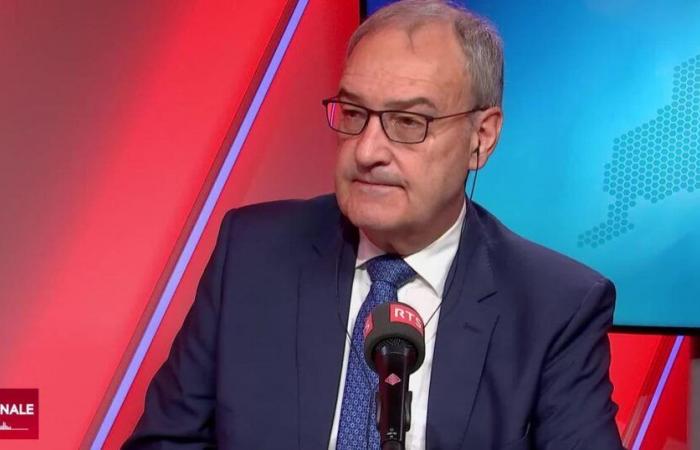
The Swiss minister of Economy Guy Parmelin was last week in Washington to plead the cause of the Swiss economic fabric to the Trump administration. Invited in the morning, he is careful but optimistic.
To convince the United States to mitigate or give up 31% of customs taxes announced in early April against Switzerland, the Confederation has multiplied contacts. But after the excitement of the announcement, the time is for dialogue and not for formal negotiations. Back from WashingtonKarin Keller-Sutter and Guy Parmelin informed the rest of the Federal Council on Wednesday, which must now define the priority themes of a future declaration of intent to continue the discussions.
>> Read on this subject: Switzerland and China advocate “dialogue” in the face of American taxes
“Constructive and pleasant” atmosphere
For the federal advisor in charge of the Economy, this American trip has proven useful. “The goal was also to understand what the Trump administration wanted. It was necessary to clarify certain points and detect which were the essential interlocutors. For example, we were able to agree to have an entry point at the Treasury Secretariat,” he explains to the RTS microphone.
“In politics, when you chat with partners, there are never any friends, there are always interests,” he continues. “But the atmosphere was constructive, pleasant and not at all aggressive. Now, we must identify the potential fields where we can seek an agreement. This is the object of this famous letter of intent. Different aspects must still be clarified.”
While taxes of 31% are currently suspended until the end of June, and Switzerland is taxed at 10% on its exports, the Minister of the Economy displays the objective of “returning to State ai ante“.” With this letter of intent, we hope that the deadline will not fall on July 1. This means that we will have found a way to discuss, “he said, adding that the 10% rate is already” extremely heavy “for exporting companies.
>> Also listen to the subject of the morning:
Agriculture, a “discussion theme”
According to Guy Parmelin, the objective of the White House is to be “treated in the same way as others, like the European Union, that there are no specific obstacles to them against them”.
However, in certain sectors, the issues are thorny, he concedes, especially in terms of agriculture. “We have high prices, they know it. It is a strategic, national defense area. It is a language they understand.”
And if the Americans have “not particularly asked to lower agricultural taxes”, the minister of supervision considers that this is a “possible discussion theme” on which it will be necessary to “assess the room for maneuver”. In particular, it evokes potential deregulation on foodstuffs which are not directly produced in Switzerland.
Extension of partial unemployment
The Federal Councilor UDC also wishes to hand over the church in the middle of the village: Switzerland does not benefit from preferential treatment from Washington. “They simply decided that the 15 countries with which they had the greatest deficit in their trade balance were priority. We are in this first group, and it is a good thing” in the prospect of being fixed as quickly as possible.
However, “currently, we do not formally negotiate. To negotiate, it would take a mandate from the Parliament,” he said. It also guarantees that, whatever happens, the parliament commissions will be consulted.
Asked finally on the concerns of the world of work in Switzerland, Guy Parmelin said to follow the situation closely with the State Secretariat for the Economy. “The Federal Council will very soon extend the reduction in the work schedule (RHT, partial unemployment) which ended on July 31, for a period of 18 months. The Federal Council will do everything to amortize the shock. And if the situation was to worsen, it is always ready to analyze other measures.”
Interview by Delphine Gendre
Articles Web: Pierrik Jordan







